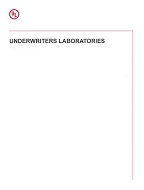UL 60730-2-6
Click here to purchase
Scope and normative references
This clause of Part 1 is applicable except as follows:
1.1 Scope
Replacement:
This part of IEC 60730 applies to automatic electrical pressure SENSING CONTROLS with a minimum gauge pressure rating of – 60 kPa and a maximum gauge pressure rating of 4,2 MPa, for use in, on or in association with, equipment. The equipment may use electricity, gas, oil, solid fuel, solar thermal energy, etc. or a combination thereof.
NOTE Throughout this standard, the word “equipment” includes “appliances” and “control system”.
This standard is also applicable to individual pressure SENSING CONTROLS utilized as part of a CONTROL SYSTEM or pressure SENSING CONTROLS which are mechanically integral with multifunctional controls having non-electrical outputs.
Automatic electrical pressure SENSING CONTROLS for equipment used by the public, such as equipment intended to be used by laymen in shops, in light industry and on farms, are within the scope of this standard.
This standard does not apply to pressure SENSING CONTROLS intended exclusively for industrial process applications unless explicitly mentioned in the relevant equipment standard.
1.1DV Modification of the first paragraph of 1.1 of the part 2 by adding the following:
This part of IEC 60730 applies to automatic electrical pressure SENSING CONTROLS for use in, on or in association with, equipment. The equipment may use electricity, gas, oil, solid fuel, solar thermal energy, etc. or a combination thereof.
1.1.1 Replacement:
This standard applies to inherent safety, OPERATING VALUES, OPERATING SEQUENCES where such are associated with equipment protection, and to the testing of automatic electrical pressure SENSING CONTROLS used in, on or in association with equipment.This standard is also applicable to the functional safety of low complexity safety related pressure SENSING CONTROLS and SYSTEMS.
This standard is also applicable to pressure SENSING CONTROLS for appliances within the scope of IEC 60335-1.
See also Annex J.
1.1.2 Addition:
This standard applies to automatic ELECTRICAL CONTROLS, mechanically or electrically operated, responsive to or controlling a pressure or vacuum.
1.1.3 Not applicable.
1.1.4 Replacement:
This standard applies to MANUAL CONTROLS when such are electrically and/or mechanically integral with pressure SENSING CONTROLS.
NOTE Requirements for manual switches not forming part of an AUTOMATIC CONTROL are contained in IEC 61058-1.
1.1.5Replacement:
This standard applies to a.c. or d.c. powered pressure SENSING CONTROLS with a rated voltage not exceeding 690 V a.c. or 600 V d.c.
1.1.6Replacement:
This standard does not take into account the RESPONSE VALUE of an AUTOMATIC ACTION of a pressure SENSING CONTROL, if such a RESPONSE VALUE is dependent upon the method of mounting it in the equipment. Where a RESPONSE VALUE is of significant purpose for the protection of the USER, or surroundings, the value defined in the appropriate equipment standard or as determined by the manufacturer shall apply.
1.1.7Replacement:
This standard applies also to pressure SENSING CONTROLS incorporating ELECTRONIC DEVICES, requirements for which are contained in Annex h.
This standard applies also to pressure SENSING CONTROLS using NTC or PTC THERMISTORS, requirements for which are contained in Annex J.
Additional subclauses:
1.1.101 This standard contains requirements for electrical features of pressure SENSING CONTROLS and requirements for mechanical features that affect their intended OPERATION.
NOTE Subclause 18.101, as it pertains to gas and/or oil CONTROLS, is under consideration pending review or revision of ISO 22967, ISO 22968 and ISO 23550 series, if applicable.
1.1.102 In general, these pressure SENSING CONTROLS are integrated or incorporated with the equipment or are intended to be integrated in, or on the equipment. This standard also covers these CONTROLS when they are independently mounted. IN-LINE CORD CONTROLS are not covered by this standard.
Product Details
- Edition:
- 3
- Published:
- 12/22/2016
